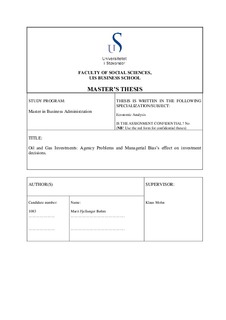| dc.description.abstract | This thesis examines classical and modern investment theory, and whether actual observations in the oil and gas industry coincide with the classical assumptions or if the modern theory more accurately explain observations. Classical investment theory presumes rationality and perfect capital markets, however actualities the recent years imply that the market development is in fact not supported by these assumptions. In the oil and gas industry, the capital expenditures have peaked over the last decade, as well as the oil price and earnings, while the oil companies' profits and share prices have experience a more moderate trend.
This investment theory study provides a systematic review of available literature on classical investment theory and modern investment theory. The review establishes a foundation to investigate whether recent contributions to investment decision theory can enhance quality, further than classical investment theory, to the explanation of later developments in oil and gas investments.
Furthermore, the thesis comprises a detailed analysis that focus on five peculiarities. These are accommodated by distinctive and recurring investment patterns observed in the market. First, oil and gas investments respond to short-term oil price change when these investments usually have a long-term horizon, and they retain dividend payouts sacrosanct when cash flows are under pressure. Second, investors are reluctant to raise debt to finance their investment plans, whereas rationality implies indifference about sources from where to collect capital. Further, announcement of cutbacks in investment are met by an increase in share price, a phenomenon that contradicts benchmark models of investment behavior and corporate finance. In addition, shareholders do not wish to receive scrip dividend instead of cash, even when offered a price discount per share that should be considered as “money in the street”.
The main finding is that modern contributions to investment theory can in fact provide explanations of the investment behavior in the oil and gas industry that correspond to a larger extent with the observed pattern, than classical investment theory. All the peculiarities may be explained by recognizing that the oil and gas industry could have been characterized by asymmetric information, agency problems, overconfidence and optimism, miscalibration, empire building and cost overruns. Whereas numerous of the investment decisions made by managers in the oil companies has not increased the firm and shareholder value, which contradicts a central principle in classical investment theory. | nb_NO |
